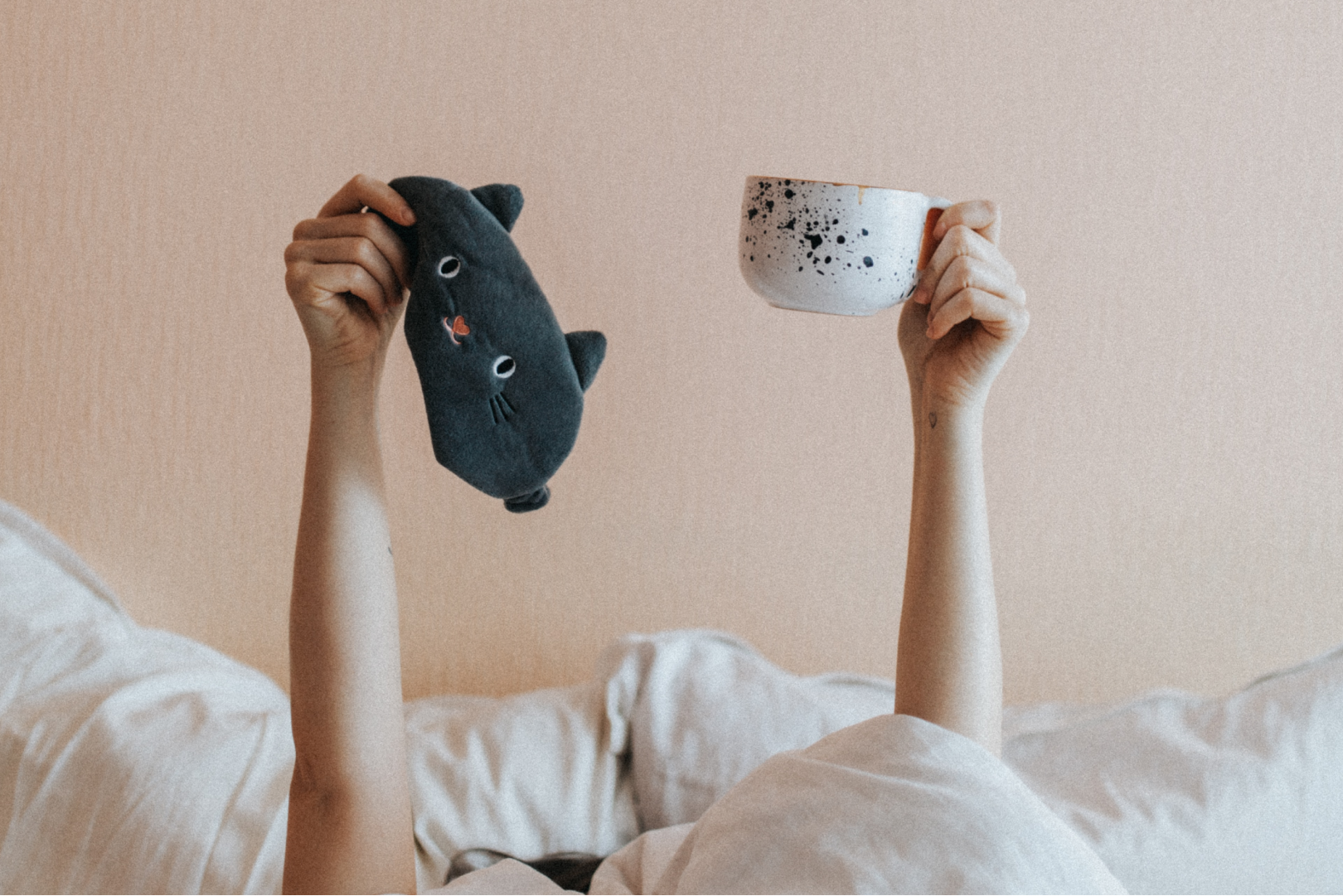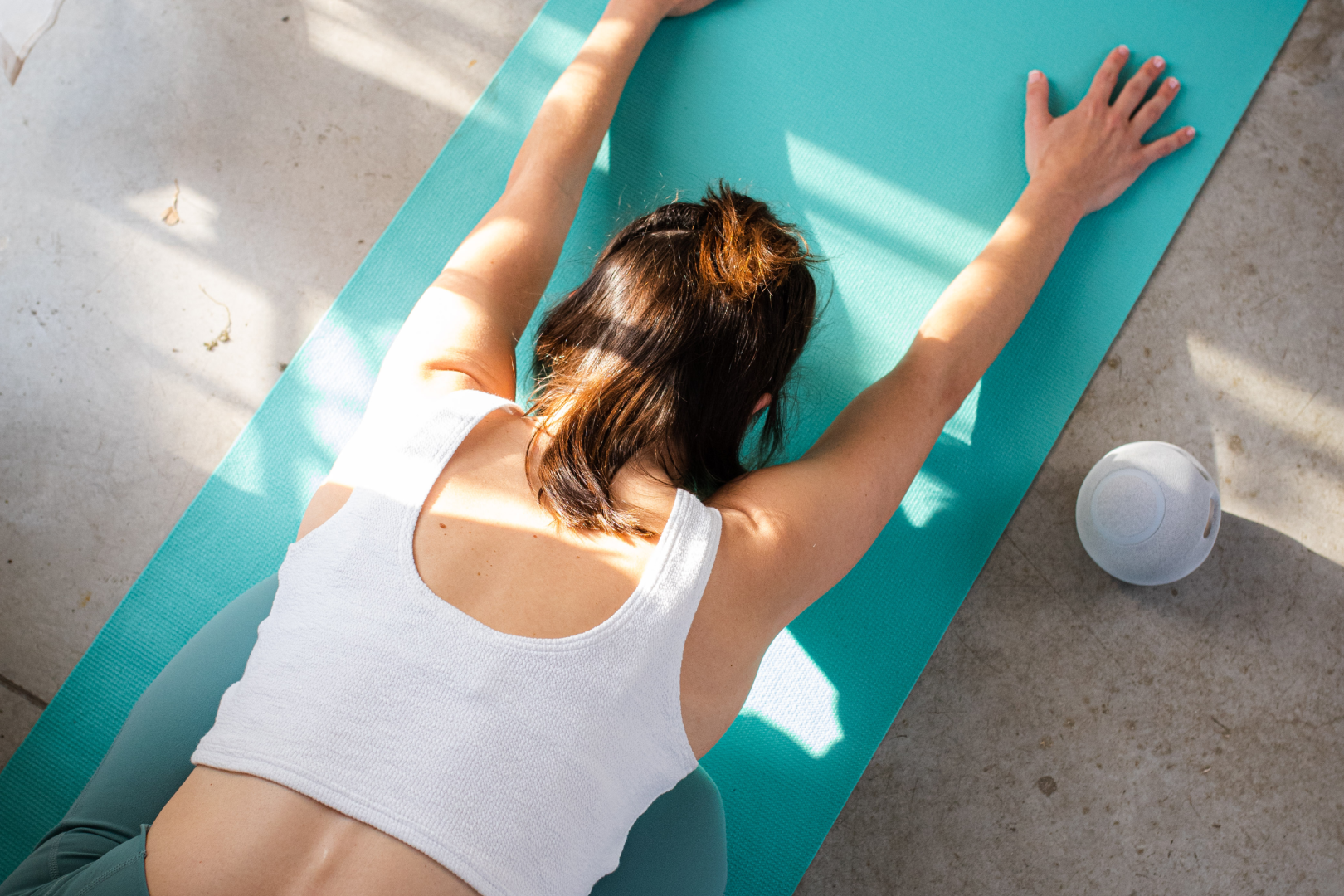It’s late at night, and you’re tired. Really tired. It’s been a long and busy day, and you want nothing more than to fall asleep.
And yet, you can’t!
Instead, you toss and turn. Every 5 minutes, you check the time. In frustration, you switch on the bedside light and scroll on your phone. No matter how much you try, you just can’t seem to relax and drift off.
Sounds familiar? If so, you are one of the 30% of Americans who suffer from mild insomnia every year. Chances are, it has to do with what’s known as “sleep hygiene.”
What is sleep hygiene?
Sleep hygiene is a concept that began in the late 1970s, developed by behavioral scientists as a treatment strategy for people suffering from mild or moderate cases of insomnia. Today, it is one of the pillars when it comes to figuring out how to fix a sleep schedule.
Sleep hygiene incorporates a set of principles and behaviors to encourage optimal conditions for sleep, both in terms of quantity and quality. These include things such as not napping during the day, having a set bedtime every night, creating comfortable sleeping conditions, and more.
When people practice good sleep hygiene, their quality of sleep tends to be better and the risk of insomnia is reduced. Conversely, bad sleep hygiene often leads to poorer sleep and a host of problems that come with it, such as headaches, fatigue, and reduced immune function.
Principles of sleep hygiene
Sleep hygiene covers a wide range of habits and behaviors connected to an individual’s sleep routine. The principles of sleep hygiene include:
Going to sleep at the same time every night: Establishing a regular bedtime strengthens the body’s natural circadian rhythm. The body comes to ‘expect’ sleep at a similar time every day. This makes it easier and quicker to fall asleep.
Minimizing daytime napping: Naps during the day upset the circadian rhythm, making the person less sleepy in the evening, when the body should naturally be winding down. One of the most important sleep hygiene techniques is to limit daytime napping, so sleep becomes a strictly nighttime activity.
Relaxing in the evening hours: Stimulants in the hours before bedtime, such as coffee, alcohol, exercise, bright lights, and noise, disrupt sleep hygiene and perk up the body’s physiology just when it needs to calm down. This makes it harder to relax and fall asleep. When you do sleep, the quality of sleep is poorer too. The same goes for mental and emotional stimulation – it is very difficult to sleep after watching a scary movie or having an argument with your partner!
Using the bed exclusively for sleep or sex: Association is a powerful psychological force. Once you begin to associate your bedroom with activities that are not conducive to sleep, it can be very hard to break that psychological connection. That’s why practicing good sleep hygiene means using the bed for sleep and sex only. Watching TV, scrolling social media on your phone, and snacking in bed are all examples of bad sleep hygiene and should be avoided.
Creating comfortable sleep conditions: Good sleep hygiene means creating an environment that encourages sleep. For example, making sure the room is at the optimal temperature for sleep (15-19 degrees C/ 60-67 degrees F), using a good quality mattress and pillow with the right firmness and support, and having correct blinds or curtains to block out light and noise, are all important for good sleep hygiene.
Reducing anxiety and worry: Stress and worry are key causes of insomnia. For good sleep hygiene, it’s important to find ways to reduce anxiety and prevent worrisome thoughts, particularly in the evening hours. For example, don’t try to balance your household budget before bedtime; leave potential worries for the daytime hours.
Getting out of bed if you can’t fall asleep: When a person can’t fall asleep, they tend to become stressed and frustrated, which only makes it less likely that they will actually drift off. This leads to the typical ‘tossing and turning’ of insomnia. Rather than staying in bed and trying to fall asleep, it is better to get up and do a relaxing or monotonous activity, and then go back to bed when feeling sleepy again.
Sleep hygiene for children
Insomnia is not just an adult problem. Twenty to 30% of children suffer from insomnia too. There are other sleep disorders that are fairly common among kids, such as nightmares, night terrors, sleepwalking and bedwetting.
Sleep hygiene is critical for children, because good sleep is so important for a child’s physical, mental and emotional development. Kids who are chronically tired are more at risk for anxiety, behavioral issues and problems at school
The good news is that kids in particular respond extremely well to routines, and a big part of sleep hygiene is creating predictable routines and habits around bedtime. For children, it is essential to keep to a set bedtime every night, avoid screens (including TV shows and computer games) in the evening hours, and practice relaxing behaviors in the leadup to sleep, such as putting away toys, enjoying a warm bath, and listening to a soothing bedtime story.
Sleep hygiene for shift workers
Sleep hygiene strategies are even more important for shift workers, who are already having to deal with disrupted sleep schedules. While insomnia is a common problem among the general population, shift workers are more at risk: clinical studies show a prevalence of insomnia among shift workers of between 13% and 76%.
For optimal sleep, shift workers need to adapt the principles of sleep hygiene as best as possible to suit their unique schedules. For example, if a worker comes off the night shift at 6 am, then the few hours after they get home are the equivalent of evening time. Draw the curtains to block out daylight, have a hot relaxing shower, and meditate before heading off to bed. Try to stick to the same bedtime (say, 9 am) and wake-up time (ie. 4pm) for the entire period of night shifts. This will help create a routine and adjust the circadian rhythm to promote good sleep even on an opposite schedule.
Why is good sleep hygiene important?
Good sleep hygiene is about creating good sleep habits – and good sleep habits are important for good sleep.
Good sleep is one of the foundations of physical and mental health. People who do not get enough sleep are at higher risk for a range of diseases, including heart disease, obesity and dementia. During sleep, the body undergoes essential repair and healing. Sleep affects the immune system too, helping it to reboot and strengthen, so it can better fight infection.
Sleep is an important factor in emotional processing and regulation. People who are sleep deprived are moodier and more prone to negative emotional responses. They are less equipped to handle life’s challenges and difficulties, and they have higher levels of anxiety and depression. This also puts a strain on their relationships with family and friends.
Finally, good sleep hygiene contributes to better cognitive functioning and alertness. This is so important for performance and satisfaction at work. It is estimated that poor sleep and insomnia among the workforce costs employers around $2000 per employee every year!
By incorporating sleep hygiene strategies into their daily routines, people can improve their sleep, and indeed improve every aspect of their lives – from health and relationships to mood and daily functioning.
What are the signs of poor sleep hygiene?
In the long term, poor sleep hygiene has consequences. If any of the signs below are familiar to you, it may be because your sleep hygiene needs improvement:
Insomnia: Insomnia or difficulty sleeping is the main sign of poor sleep hygiene. You may have trouble falling asleep, or you may fall asleep fairly easily but wake up during the night and can’t fall back asleep again.
Stress around bedtime: If the thought of trying to go to sleep stresses you out, it may be because of your sleep habits. Going to sleep means letting go, feeling calm and relaxed enough to surrender into slumber.If bedtime makes you anxious, poor sleep hygiene will definitely make it worse.
Feeling tired during the day: A good night’s sleep leaves you feeling alert and energized. If you are often tired or lethargic during the day, your sleep quality is probably poor, and that is a sign of bad sleep hygiene.
Moodiness and irritability: Sleep deprivation lowers our natural boundaries and coping mechanisms, making people susceptible to moodiness. If you are irritable around bedtime or even during the day, then it might be because of poor sleep hygiene.
Hard time concentrating: Lack of sleep also reduces cognitive functioning, leading to a lack of focus and a sense of apathy. When poor sleep habits set in, this disrupts the quality and quantity of sleep and makes it hard to concentrate and function well.
Health problems: If you suffer from chronic headaches, digestion problems, or other stress-related physical symptoms, it may be because of poor sleep hygiene. Of course, it is important to consult a doctor about any new physical symptoms. However, if medical causes are ruled out, and your sleep quality is low, then take a look at your sleep hygiene – fixing that may well help you deal with your health problems too.
10 ways to improve sleep hygiene
When it comes to sleep, everyone has different needs, and these are partly based on genetics (meaning you can’t change them). However, sleep hygiene comes down to behavior. No matter your individual circumstances, there are ways to improve sleep hygiene based on behavioral changes alone,
Here are 10 sleep hygiene tips that will make your sleep habits – and your sleep! – much better:
Maintain a regular sleep schedule
This is probably the most important tip of all: go to bed and wake up at the same or similar time, every day. Whatever your age, a regular sleep schedule is clinically proven as the basis for good sleep. Period.
Establish a calming bedtime routine and adhere to it consistently
Creating a sense of relaxation around sleep is vital to good sleep hygiene. Make it a habit to calm yourself down before bed. Activities such as a hot bath, meditation, aromatherapy, or listening to deep sleep music before bed are all ways to build relaxation into your sleep routine.
Power down electronic devices prior to bedtime.
Screens of all types are highly stimulating to the brain, which is not conducive to sleep. It is important to avoid screens at least two to three hours before bed. This includes smartphones, computers, TV, and gaming.
Engage in physical exercise during the day.
Physical exercise in the daytime supports the body’s circadian rhythm. It encourages the body’s natural urge to be active and busy during the day, and relaxed and restful at night. Apart from the immense health benefits, regular exercise is also good sleep hygiene.
Restrict your consumption of caffeine.
Caffeine is a stimulant, and stimulants of all kinds are a big no-no when it comes to sleep hygiene. Of course, it is also important to enjoy life, so your regular morning coffee is totally OK. However, if you’re a coffee freak and you also want to improve your sleep hygiene, try to reduce your consumption levels.
Optimize your sleep environment to suit your needs.
Some people like a soft mattress. Other people swear by a firm one. Some people sleep best in pitch-black darkness. Others don’t like it, and prefer a small amount of light. There is no right or wrong. Experiment with what works for you to make your environment comfortable and optimal for your personal sleep hygiene.
Reserve your bed exclusively for sleep purposes.
The bed should be a place for relaxation and sleep. Good sleep hygiene conditions you to associate your bed with sleeping. Ideally, being in bed should even stimulate sleepiness. Avoid other activities in bed, like watching TV, checking email, or discussing problems with your partner.
Go to bed only when you feel tired.
If you go to bed before you need to, you won’t be able to fall asleep. You’ll just toss and turn, or do something else that is not conducive to sleep, like checking social media on your phone. Set yourself up for good sleep habits by going to bed only when you are tired and sleepy.
Minimize or avoid daytime napping for better sleep hygiene.
Napping during the day upsets your regular sleep routine and confuses your circadian rhythm. This makes it harder to sleep at night when you need to. Break the habit of daytime naps, and increase your nighttime sleep duration instead.
Address and manage stress levels before bedtime to enhance sleep.
Insomnia is one of the most common symptoms of anxiety and depression. Even for people who do not have a chronic mental health issue, just the usual worries about life can make it harder to get a good night’s sleep. To establish good sleep hygiene, build stress management techniques and relaxation practices into your life, and particularly into the evening routine before sleep. Meditation, self-massage, and relaxing activities such as reading or journal writing are all good ones to try.
Having trouble sleeping? Try biofeedback
Another alternative you can try to improve sleep hygiene is biofeedback for sleep disorders. Biofeedback is a mind-body technique that helps you understand how your body’s physiology responds to thoughts and feelings as they arise. Biofeedback can be particularly helpful for the treatment of insomnia.
When a person is having trouble sleeping, they typically become stressed, making it even harder to fall asleep, which only increases the stress and frustration – and then the loop of insomnia sets in. With a biofeedback device like Reflect, the individual can ‘see’ this pattern occur in real-time, and learn what they need to do to prevent it.
Sleep hygiene is vital to good sleep, which is key to both mental and physical health. Fortunately, the keys to good sleep hygiene are in your hands. Try the 10 tips above to change your sleep habits and improve your sleep hygiene. You’ll soon be experiencing the incredible benefits of a good night’s sleep.






